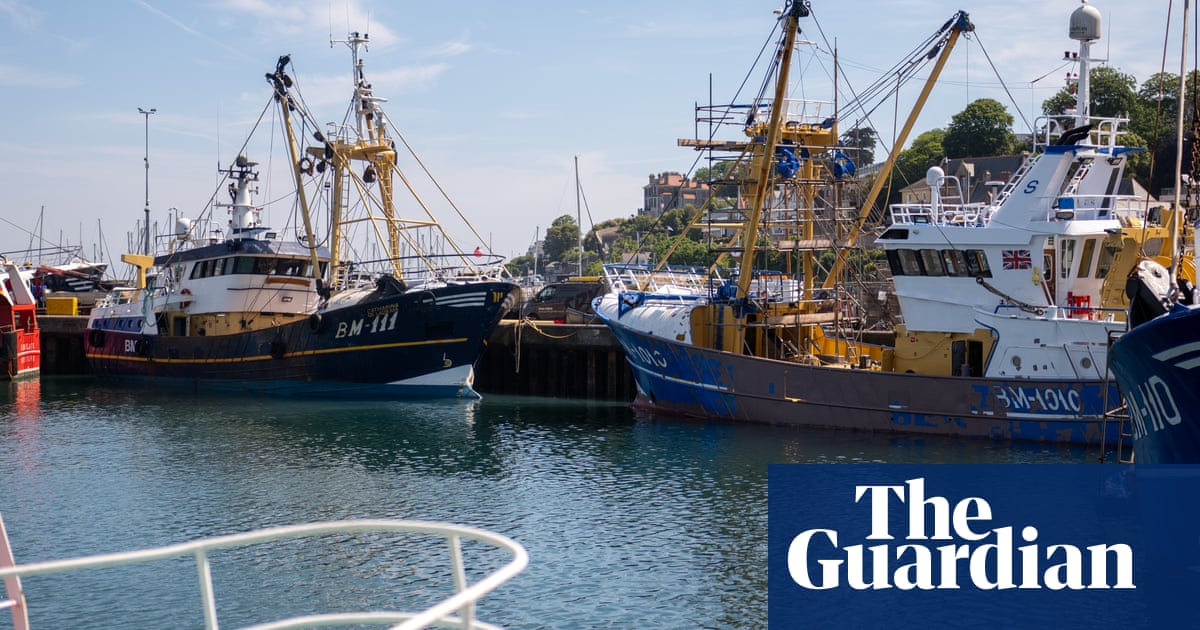Preparing the nets on board the Amethyst trawler in Brixham harbour, fisher Wesley Loveland is angered and baffled by the latest deal between the UK and the EU.
“It’s a disaster,” Loveland says. “Selling out the fisherman for pet passports.”
Keir Starmer hailed his deal with the EU, set out at a Monday summit in London, as a “win-win” for both parties, which would be the start of a “new era” in the UK-EU relationship.
The wide-ranging deal will allow more British travellers to use passport e-gates when going on holiday toEurope, while farmers will get swifter, easier access to trade on the continent as a result of an agreement on animal and plant product standards.
But the plan has been criticised over the agreement to grant European fishing trawlers a further 12 years’ access to British waters.
The rightwing, pro-Brexit press was seething with headlines including “Kiss goodbye to Brexit” in the Telegraph, “Starmer’s Surrender” in the Daily Mail and “Done Up Like a Kipper” in the Sun.
Loveland, who predominantly catches Dover sole, said the UK government should have negotiated better terms for UK fishers instead of extending the current agreement for 12 years.
“The fish in these waters are worth billions to the French and others,” says Loveland, 46, from Brixham. “He could have used the fishing industry to negotiate better terms on migration or more important things than pet passports.”
The prospects of the arguments of 2016 resurfacing trouble Loveland, who has fished for 30 years. “When Brexit was going through, it was stressful,” he says. “I haven’t even watched TV since Starmer has been in office. It’s got back to that again, divisive. It’s really divisive.”
But there is another side of the deal, the impact on exports. The UK government says fish caught in British waters can now be processed and sold into the EU without veterinary checks, eliminating huge costs created by Brexit.
Ian Perkes, who has owned his fish merchant business in Brixham harbour since 1976, said he is hopeful the deal will see a significant relaxation in red tape for his exports – although it remain unclear exactly what the deal proposes and when it will kick in.
“We’re waiting with bated breath now, waiting to see what exactly does happen,” he says.
“Since Brexit, it’s a fact, fish exports have been down 20%. They’re down 20% purely because of the extra costs involved. I’ve seen three big companies go bankrupt, purely through the extra costs.
“We started this in 1976 so for 44 years, we traded anywhere around the world, especially Europe, with no issues. And now, all of a sudden, since Brexit, we’ve gone from three pieces of paperwork per day to at least 30.”
Much of the paperwork is taken up by strict health checks introduced since Brexit which Perkes, 69, says have been devastating for the merchants. He gives an example of one catch worth £80,000 to his business that was written off because French authorities claimed the fish had been stored at -12C rather than -35C, which was disputed. Perkes had to pay another £15,000 for its incineration. Another consignment was rejected because the latin name for the species, Dover sole orSolea Solea, was written incorrectly.
Perkes voted for Brexit and has since spoken out about the devastating impact leaving the EU had on UK fish exports.
“We weren’t aware – not at any time were any charges mentioned,” Perkes says, recalling the Brexit campaign in 2016. “We assumed, naively, it seems now, that we were going down the route of a Norway scenario right, where upon it was free trade. We never envisaged these border controls.”
But back out on the harbour, the fishers remain frustrated.
Paul Dyer, who worked on boats for 17 years before becoming a superintendent responsible for the management of a fleet of boats, said: “The EU boats were only supposed to be able to fish in our waters for another year. Now it’s going to be another 12 years. It means a lot less income for UK fishermen.”
Asked how it impacted his view of politics, Dyer said: “They are all the same. Conservative. Labour. It doesn’t matter.”
Aboard the William of Ladram trawler, Kyle Evans, who describes himself as Brixham born and bred and has worked on the boats for 28 years, has been left jaded by yet another twist and turn in his industry.
“Personally I think nothing is going to change,” he says. “We’ve heard all this sort of talk before. For us, the deal basically means business as usual.”
Asked about the headlines branding the deal a “surrender”, Evans, who was about to set out on a seven-day haul, said: “It’s just usual politics. People love a story. They want there to be a row. Whatever the government says, it often turns out to be a lie anyway.”
